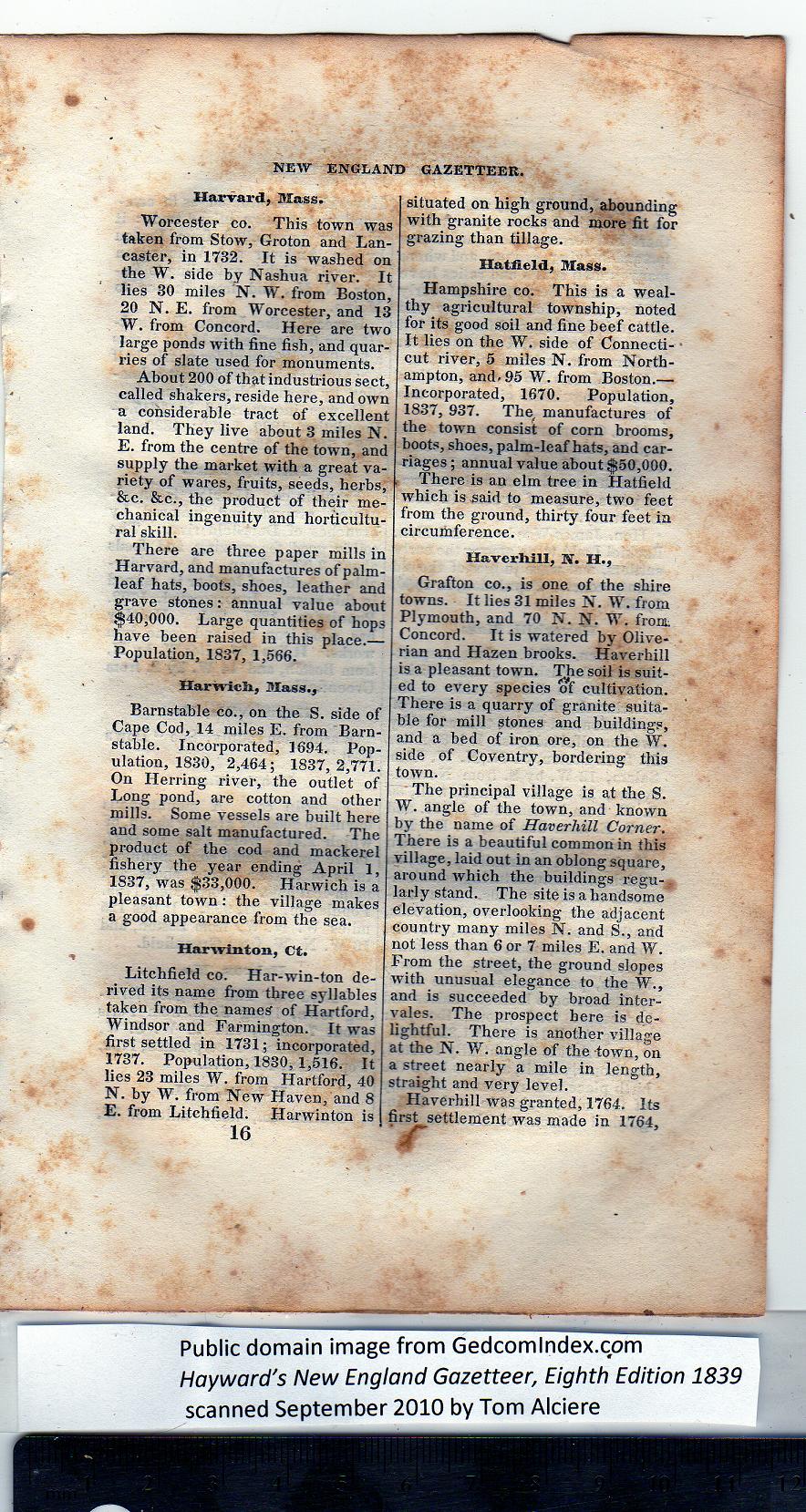|
Harvard, Mass.
Worcester co. This town was
taken from Stow, Groton and Lan-
caster, in 1732. It is washed on
the W. side by Nashua river. It
lies 30 miles N. W. from Boston,
20 N. E. from Worcester, and 13
W. from Concord. Here are two
large ponds with fine fish, and quar-
ries of slate used for monuments.
About 200 of that industrious sect,
called shakers, reside here, and own
a considerable tract of excellent
land. They live about 3 miles N.
E. from the centre of the town, and
supply the market with a great va-
riety of wares, fruits, seeds, herbs,
&c. &c., the product of their me-
chanical ingenuity and horticultu-
ral skill.
There are three paper mills in
Harvard, and manufactures of palm-
leaf hats, boots, shoes, leather and
grave stones: annual value about
$40,000. Large quantities of hops
have been raised in this place.—
Population, 1837, 1,566.
Harwich, Mass.,
Barnstable co., on the S. side of
Cape Cod, 14 miles E. from Barn-
stable. Incorporated, 1694. Pop-
ulation, 1830, 2,464; 1837,2,771.
On Herring river, the outlet of
Long pond, are cotton and other
mills. Some vessels are built here
and some salt manufactured. The
product of the cod and mackerel
fishery the year ending April 1,
1837, was $33,000. Harwich is a
pleasant town: the village makes
a good appearance from the sea.
Harwinton, ct.
Litchfield co. Har-win-ton de-
rived its name from three syllables
taken from the names of Hartford,
Windsor and Farmington. It was
first settled in 1731; incorporated,
1737. Population, 1830, 1,516. It
lies 23 miles W. from Hartford, 40
N. by W. from New Haven, and 8 j
E. from Litchfield. Harwinton is j
16
situated on high ground, abounding
with granite rocks and more fit for
grazing than tillage. |
Hatfield, Mass.
Hampshire co. This is a weal-
thy agricultural township, noted
for its good soil and fine beef cattle.
It lies on the W. side of Connecti-
cut river, 5 miles N. from North-
ampton, and»95 W. from Boston.—
Incorporated, 1670. Population,
1837, 937. Tim manufactures of
the town consist of corn brooms,
boots, shoes, palm-leaf hats, and car-
riages; annual value about $50,000.
There is an elm tree in Hatfield
which is said to measure, two feet
from the ground, thirty four feet in
circumference.
Haverhill, N. IT.,
Grafton co., is one of the shire
towns. It lies 31 miles N. W. from
Plymouth, and 70 N. N. W. front
Concord. It is watered by Olive-
rian and Hazen brooks. Haverhill
is a pleasant town. The soil is suit-
ed to every species of cultivation.
There is a quarry of granite suita-
ble for mill stones and buildings,
and a bed of iron ore, on the W.
side of Coventry, bordering this
town.
The principal village is at the S.
W. angle of the town, and known
by the name of Haverhill Corner.
There is a beautiful common in this
village, laid out in an oblong square,
around which the buildings regu-
larly stand. The site is a handsome
elevation, overlooking the adjacent
country many miles N. and S., and
not less than 6 or 7 miles E. and W.
From the street, the ground slopes
with unusual elegance to the W.,
and is succeeded by broad inter-
vales. The prospect here is de-
lightful. There is another village
at the N. V/. angle of the town, on
a street nearly a mile in length,
straight and very level.
Haverhill was granted, 1764. Its
first settlement was made in 1764,
r— 3 |
